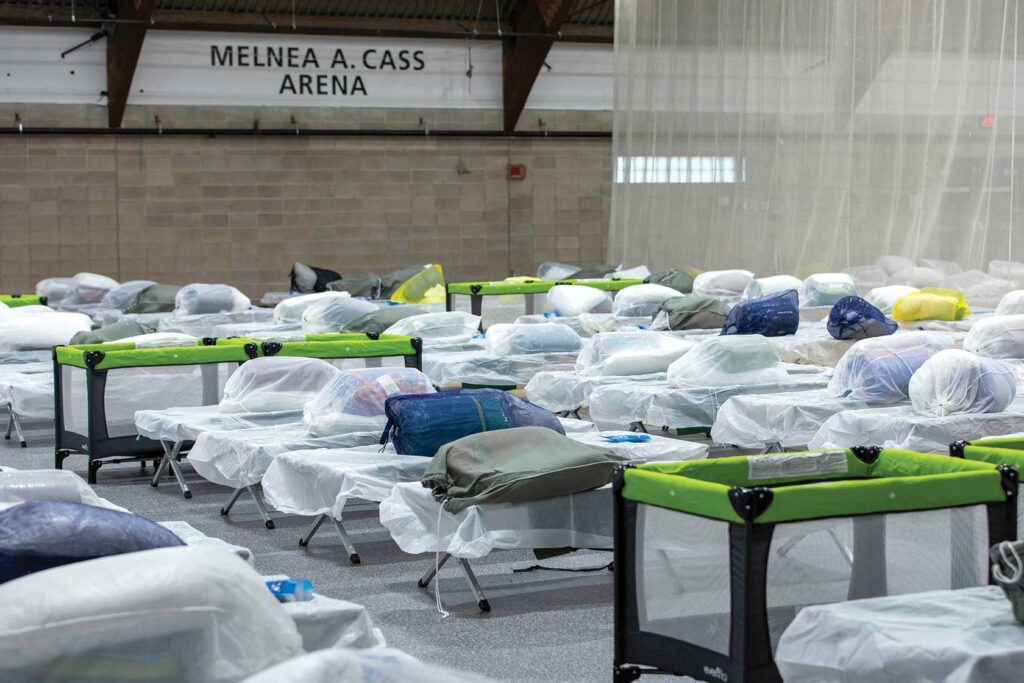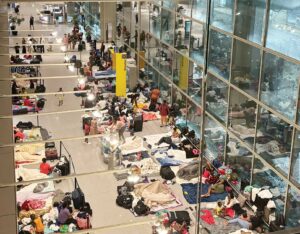New state policy limits emergency shelter stays
Immigrant service providers contending with growing need

As a new state shelter policy that will limit longer-term access gears up, support providers for migrants in the state are grappling with increased need and growing panic from the communities they serve.
That policy sets a priority status for families homeless because of a no-fault eviction, because of circumstances like fires or floods or if at least one member of the family is a veteran, adding to an existing list of prioritizations that includes significant medical needs, families with newborn children and those at risk of domestic violence.
Under the policy, those not within the groups prioritized for placement at the state’s emergency assistance shelters can stay at so-called “temporary respite centers” for up to five days. If they do, they are required to wait six months or more before they can be placed in the state’s emergency shelter system.
The policy was announced July 23 and went into effect Aug. 1, starting that five-day clock for the first families in the state’s overflow shelters. That move also transitioned the state’s safety net sites into temporary respite shelters and left providers grappling with what the change might mean for families already struggling to find housing.
“Looking into a mother’s eyes [who is] looking at you with a baby, saying, ‘I don’t have any place to go tonight, I’m going to be in the street,’ as a provider, this is taking a huge toll on us,” said Geralde Gabeau, founder and executive director of the Immigrant Family Services Institute in Mattapan.
In an interview days after the policy officially went into effect, Gabeau said large numbers of families were showing up in large numbers looking for help, leaving the Immigrant Family Services Institute in “panic mode,” trying to shore up plans for places to stay before the five-days ran out.
“We have the [families] who are already here and then the ones who are coming. Everyone is on the alert, because they don’t know exactly what to expect,” she said.
Her organization was left making late-night calls trying to find beds for families or working to connect them with families and friends in the state or elsewhere in the country — under a voluntary reticketing program, the state will cover travel expenses if migrants have a safe, long-term place to stay outside of Massachusetts — for support.
As the first five-day period was starting, she said all providers in the area were feeling the pressure.
In a statement announcing the policy, Gov. Maura Healey said this is the latest development in a months-long crisis under which the state’s Emergency Access shelter system has gone through rapid growth that is “not sustainable.” She said the new policy is an effort supposed to tide families over, offering short-term lodging while connecting them with other services like the reticketing program.
She also pointed to other initiatives the state has taken to connect migrant families with support, such as advocacy that led to a work authorization clinic in November which the state said helped more than 1,000 migrants start the process of getting official approval to work in the United States.
The new step, she said, is required without further action at the federal level.
“Massachusetts is out of shelter space, and we simply cannot afford the current size of this system. Our administration has taken significant action over the past year to make the system more sustainable and help families leave shelter for stable housing. But with Congress continuing to fail to act on immigration reform, we need to make more changes,” she said in the statement.
But still, the five-day policy is one raising flags locally, including for Boston officials. In a letter sent Aug. 1, a group of nine city councilors wrote in opposition to the new policy, saying that the new policy would likely force families onto the street.
“Housing is a human right, and we cannot sit idly by when faced with a policy that may result in young children being forced to sleep on our city streets,” they wrote in the letter.
They pointed to the long history of welcoming migration from places like Haiti, the Dominican Republic and Vietnam.
In a last-minute tweak, the Healey-Driscoll administration would have the discretion to extend the time a family can stay at a shelter to 30 days. The city councilors welcomed the alteration but wrote that they think it ultimately demonstrates that the state should “take more time to come up with a feasible solution.”
The policy follows a Healey-Driscoll administration decision to shut Logan International Airport as a makeshift shelter, where migrant families had been sleeping on the floor of the airport’s Terminal E at night. That change went into effect July 9. In the wake of that decision, families were in many cases left wandering for shelter.

Dozens of families prepare to sleep in the international arrivals section of Logan Airport on Thursday, June 20. BANNER PHOTO
In the wake of that decision, some news outlets reported migrant families being dropped off at MBTA stations like Wollaston Red Line stop in Quincy by the day programs that hosted them, with nowhere else to go.
But all the actions come from a shelter system that is overcrowded and increasingly costly. At a meeting of the Emergency Assistance Commission last month, that group estimated running the shelter system in the next fiscal year could cost over $1 billion.
In August 2023, Healey declared a state of emergency, citing a rising migrant family count and limited space in its emergency shelter system. By October, she announced that the shelter system was full.
Since then, the state has looked to open temporary shelters, including one in the Melnea Cass Recreational Complex in Roxbury, which housed families from January until June. But long-term solutions that will allow the state to continue to house migrants and other homeless families — as required by the state’s “right to shelter” law, which provides pregnant women and families with children under 21 the legal right to shelter — are yet to be forthcoming.
The state has also taken steps to limit the time families are in the shelter system.
As she waits for more support from the state around its shelter policies, Gabeau said she’d like to see more local groups get involved in opening their doors to migrants, especially at night.
A number of local programs have offered migrant families a place to go during the day, but while some, like Bethel African Methodist Episcopal Church in Jamaica Plain, have opened spaces like their rectory to families at night, Gabeau said she’d like to see more of the same from other groups.
“I believe this is really the time for others to show our true humanity, because having a baby, having a pregnant woman on the street at nighttime, not knowing where they’re going to sleep, it’s not acceptable,” Gabeau said. “We can do better.”






